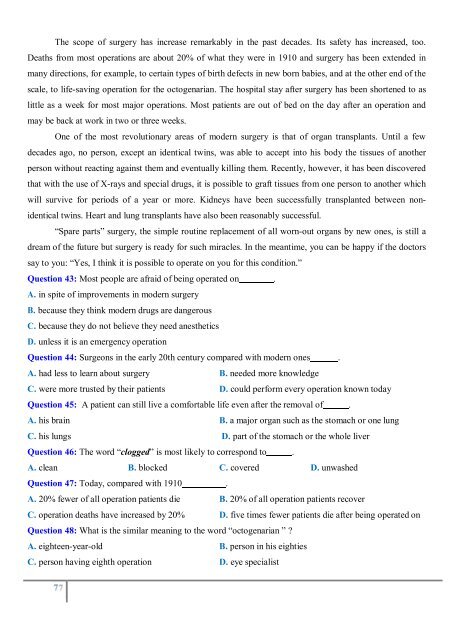12 đề thi thử THPT Quốc gia môn tiếng Anh năm 2018 có lời giải chi tiết
https://app.box.com/s/nnfa5e7e8wjt4ogw5c12nscparzxshyv
https://app.box.com/s/nnfa5e7e8wjt4ogw5c12nscparzxshyv
You also want an ePaper? Increase the reach of your titles
YUMPU automatically turns print PDFs into web optimized ePapers that Google loves.
The scope of surgery has increase remarkably in the past decades. Its safety has increased, too.<br />
Deaths from most operations are about 20% of what they were in 1910 and surgery has been extended in<br />
many directions, for example, to certain types of birth defects in new born babies, and at the other end of the<br />
scale, to life-saving operation for the octogenarian. The hospital stay after surgery has been shortened to as<br />
little as a week for most major operations. Most patients are out of bed on the day after an operation and<br />
may be back at work in two or three weeks.<br />
One of the most revolutionary areas of modern surgery is that of organ transplants. Until a few<br />
decades ago, no person, except an identical twins, was able to accept into his body the tissues of another<br />
person without reacting against them and eventually killing them. Recently, however, it has been discovered<br />
that with the use of X-rays and special drugs, it is possible to graft tissues from one person to another which<br />
will survive for periods of a year or more. Kidneys have been successfully transplanted between nonidentical<br />
twins. Heart and lung transplants have also been reasonably successful.<br />
“Spare parts” surgery, the simple routine replacement of all worn-out organs by new ones, is still a<br />
dream of the future but surgery is ready for such miracles. In the meantime, you can be happy if the doctors<br />
say to you: “Yes, I <strong>thi</strong>nk it is possible to operate on you for <strong>thi</strong>s condition.”<br />
Question 43: Most people are afraid of being operated on .<br />
A. in spite of improvements in modern surgery<br />
B. because they <strong>thi</strong>nk modern drugs are dangerous<br />
C. because they do not believe they need anesthetics<br />
D. unless it is an emergency operation<br />
Question 44: Surgeons in the early 20th century compared with modern ones .<br />
A. had less to learn about surgery B. needed more knowledge<br />
C. were more trusted by their patients D. could perform every operation known today<br />
Question 45: A patient can still live a comfortable life even after the removal of .<br />
A. his brain B. a major organ such as the stomach or one lung<br />
C. his lungs D. part of the stomach or the whole liver<br />
Question 46: The word “clogged” is most likely to correspond to .<br />
A. clean B. blocked C. covered D. unwashed<br />
Question 47: Today, compared with 1910 .<br />
A. 20% fewer of all operation patients die B. 20% of all operation patients recover<br />
C. operation deaths have increased by 20% D. five times fewer patients die after being operated on<br />
Question 48: What is the similar meaning to the word “octogenarian ” ?<br />
A. eighteen-year-old B. person in his eighties<br />
C. person having eighth operation D. eye specialist<br />
7

















